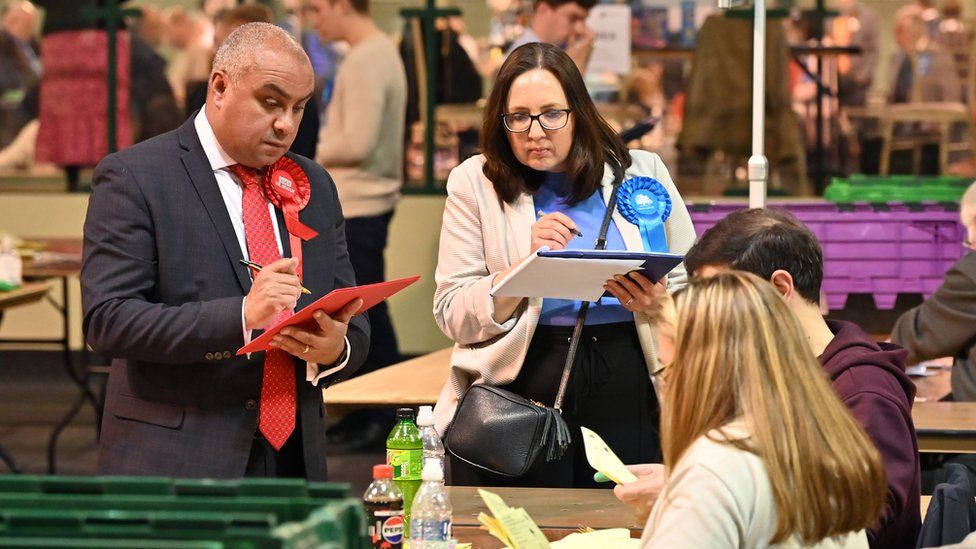
By Paul Seddon
Politics reporter
Millions of voters have cast their ballots in the last big test of public opinion before a general election.
The results of local, mayoral and police and crime commissioner elections in England and Wales will continue to roll in over the next 48 hours.
But here are the key takeaways so far.
Labour’s general election chances
Labour has gained over 140 council seats, taking control of seven councils, including key areas such as Milton Keynes and Nuneaton, a traditional bellwether seat at general elections.
There is a 9% average swing so far from the Tories since 2021, the last time most seats were contested.
Its best result so far has arguably been in the by-election in Blackpool South, held alongside the local votes, which it won with a 26% swing from the Tories.
That victory was in line with national opinion polls, which suggest Sir Keir Starmer’s party is heading for a general election victory.
Bad results for the Conservatives
The party has so far lost about half the seats it is defending, increasing internal pressure on Prime Minister Rishi Sunak.
It has lost over 330 councillors and control of six councils, including Basildon in Essex, which gained an iconic status for the Tories under Margaret Thatcher.
But there was some respite in the Tees Valley, where incumbent Tory Ben Houchen won a third term as regional mayor.
The party will also be hoping for a victory in the West Midlands mayoral race to give the party something positive to talk about in the coming days.
Red dawn for mayors
Labour won a trio of newly-created regional mayor roles, continuing its recent successes in this area in recent years.
Although its victory in the North East was widely expected, it will be particularly pleased with its victory in the East Midlands, expected to be a key battleground at the general election
Its York & North Yorkshire win also provided the party with a PR coup, as the region contains Rishi Sunak’s constituency.
A further seven mayoral results are expected on Saturday, including in London, where Sadiq Khan is trying to secure a third term against Tory opponent Susan Hall.
Gaza stance affecting Labour vote
Labour has suffered some heavy losses in wards with a large number of Muslim voters, in a sign its stance on the Israel-Gaza war is affecting its vote in those areas.
On average, the party’s vote is down 11% compared to last year in wards where more than one in 10 residents identify as Muslim.
But there is some evidence the biggest drops in support are largely confined to wards where the party’s support was already very strong.
It lost control of Oldham in Greater Manchester, where two councillors quit the party over Gaza earlier this year.
National campaign co-ordinator Pat McFadden has acknowledged Gaza was a factor there – but is also pointing to local factors too.
The party will be waiting to study further data from other seats with a high Muslim population as it comes in.
Image source, Getty Images
Sir Keir Starmer travelled to Blackpool to toast his party’s by-election success
Mixed bag for Reform UK
The party won 16.9% of the vote in Blackpool South, coming third, only 117 votes behind the Tory candidate.
It was its best performance yet in a Westminster by-election, although not as good as the 28.9% it won in Peterborough in 2019 in its previous guise as the Brexit Party.
The share of the votes suggests that while about two-thirds of the Tory vote may have gone to Labour, about a third went to Reform – something that may worry Tory election strategists.
However, the party is yet to win a seat so far in the local elections.
Assessing the party’s performance here is more difficult, however, as it is only standing just over 326 candidates in 316 wards, a very low number.
Greens and Lib Dems eye gains
These parties will be hoping to perform well in key areas, with both planning to run highly targeted campaigns at the general election.
The Liberal Democrats have made modest gains of 55 councillors so far, although some of its target seats are still to declare.
It failed to take control of West Oxfordshire, a target area, but will be hoping for strong results in Wokingham and Elmbridge in Surrey, as it looks to challenge the Tories in seats in southern England.
The Greens have gained 40 seats so far, and are hoping to become the largest party in Bristol – a city containing one of its top target seats at the general election.
The party has increased its vote share in areas with a high Muslim population, as well in areas with lots of students.
Image source, Getty Images
Voter ID wrangles
Boris Johnson hit the headlines after being turned away from his local polling station after forgetting his voter ID.
The former prime minister, whose government introduced the rules, was later able to vote after returning with the right documentation.
The government also confirmed it intends to add Veteran Cards to the list of acceptable ID, after some former service personnel were turned away at polling stations.
Meanwhile, Conservative MP Tom Hunt said his dyspraxia caused him to lose his passport and he had to arrange an emergency proxy vote.








